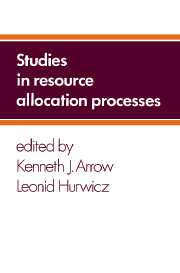Book contents
- Frontmatter
- Contents
- Preface
- Acknowledgments for reprinted articles
- PART I General introduction
- PART II Economies with a single maximand
- PART III Economies with multiple objectives
- 1 Stability of competitive-equilibrium
- 2 Competitive stability under weak gross substitutability
- 3 Stability in oligopoly
- 4 Studies in local stability
- 5 Dynamic shortages
- 6 Foundations of price dynamics
- PART IV General characterizations of allocation processes
- Appendix: An optimality criterion for decision-making under ignorance
- Author index
- Subject index
- Index of examples
4 - Studies in local stability
Published online by Cambridge University Press: 04 April 2011
- Frontmatter
- Contents
- Preface
- Acknowledgments for reprinted articles
- PART I General introduction
- PART II Economies with a single maximand
- PART III Economies with multiple objectives
- 1 Stability of competitive-equilibrium
- 2 Competitive stability under weak gross substitutability
- 3 Stability in oligopoly
- 4 Studies in local stability
- 5 Dynamic shortages
- 6 Foundations of price dynamics
- PART IV General characterizations of allocation processes
- Appendix: An optimality criterion for decision-making under ignorance
- Author index
- Subject index
- Index of examples
Summary
The conditions under which a Walrasian system of multiple markets will be stable have been investigated by a number of authors under the implicit assumption of static expectations. It often has been assumed that expectations based upon an extrapolation of current rates of change (rather than upon the assumption that the future would be like the present) would prevent the system from converging onto its equilibrium position at all. Since interesting results have been scarce and difficult to achieve even in the case of static expectations, it is not surprising that little has been done with the relationship between extrapolative expectations and dynamic stability. In this paper, we shall introduce, under rather restrictive assumptions, a type of extrapolative expectations and we shall test its effects on the stability of a dynamic system.
Excess demands in a multiple market system are usually taken to be functions of the current prices of all goods. Ideally, it would be desirable also to include expected prices for all future time periods and for all individuals and all assets as arguments of the excess demand functions. A theory of such formal generality, however, would be necessarily devoid of much content. Abstractions and simplifying assumptions are necessary. There are many possible expectations functions by which people might relate current and expected prices, and there is a variety of ways to represent plausibly the type of extrapolative expectations which we wish to describe. Our choice was made largely on the grounds of mathematical simplicity.
- Type
- Chapter
- Information
- Studies in Resource Allocation Processes , pp. 311 - 351Publisher: Cambridge University PressPrint publication year: 1977



